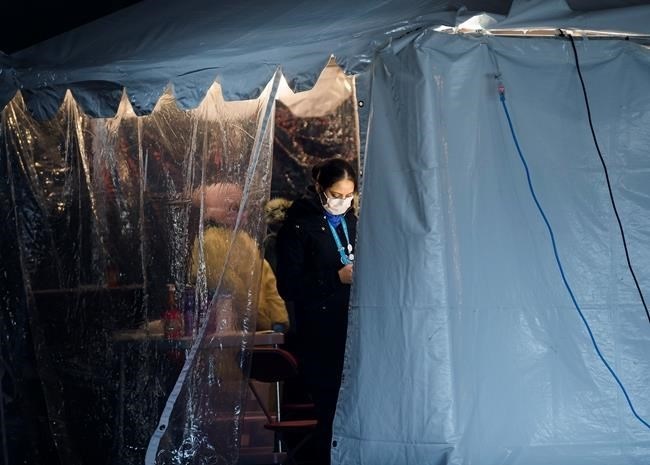
Health care workers test patients in a COVID-19 drive thru assessment centre at a Hospital in Mississauga, Ont., on Monday, March 30, 2020.
Image Credit: THE CANADIAN PRESS/Nathan Denette
April 15, 2020 - 8:00 PM
OTTAWA - Life in Canada won't return to normal until Canadian authorities can quickly find and weed out new outbreaks of the virus that causes COVID-19, but the country is far from capable of that now.
The capacity to test wide swaths of the population for COVID-19 has been touted by the World Health Organization as one of the key requirements for countries considering loosening physical distancing measures.
But Canada's ability to test has been stymied by global supply shortages and some provinces say they've had to prioritize whom they swab, even among people who are clearly sick with something.
Government and health officials say they're working on it.
"When we are able to loosen the controls on social distancing and start to reopen our economy, massive, rapid testing on a very wide-scale basis will be an essential part of the vigilance we have to have," Prime Minister Justin Trudeau said Wednesday.
Once the first wave of the virus has ebbed, the government will have to be able to move fast to find new cases and keep those people from igniting a new outbreak, Trudeau said.
Canada has tested more than 462,000 patients for COVID-19 since the pandemic began.
The government is going to have to do better than that, said Timothy Sly, an epidemiologist and professor emeritus at Ryerson University’s school of occupational and public health.
He said Canada needs to know who is immune, who is at risk, and who is positive for the virus so they can take the necessary respective precautions, and the government can ease up on blanket orders to isolate.
"Gradually we’ll see the testing increase and we’ll begin to know who's who," Sly said.
It's particularly important, he said, in light of recent evidence that people can carry and transmit the virus without symptoms.
"They are really dangerous," he said, since they can spread the virus without knowing it.
Canada's rate of testing, relative to its population, is ahead of the United States', but falls behind countries like Germany and Iceland, Sly said.
Each province sets its own criteria for who should be tested. With restricted test supplies, many have focused their efforts on people in high-risk settings like hospitals and long-term-care centres.
But government and laboratory officials are working on the supply and capacity issues every day, said chief public health officer Dr. Theresa Tam.
First, they're trying to boost domestic supplies, so Canada is less reliant on other countries for the kits needed to take samples and the reagent chemicals needed to process them, she said.
New Brunswick company Luminultra announced Wednesday it would manufacture reagents for 500,000 tests per week, which are to be distributed across Canada as part of its contract with the federal government.
Health Canada has also approved a new rapid test kit created by Ottawa company Spartan Bioscience, which will be a key part of the government's strategy for tracking outbreaks in remote and Indigenous communities because it eliminates the time it takes to transport specimens, Tam said.
She defended the current rate of testing Canada has undertaken in the meantime. The fact that 94 per cent of tests have so far come back negative shows that Canada is striking a balance between targeting at-risk groups and trying to identify community transmission, she said.
The government may also soon be able to test for people who are immune to the virus, which could play a major role in letting people out of isolation and back to work, Sly said.
"Those people are going to be solid gold," he said. "They can go to work straight away."
Tam cautioned that health authorities are still trying to understand the immunology of the virus, including how well-protected people are after surviving a bout with it, but said the government is already investigating the accuracy of those antibody tests.
Even after all those diagnostic tests are in place and restrictions are gently loosened society will still look a little different, Sly said.
Until there is a vaccine the virus will still be a threat, particularly for older people and those with respiratory problems, and they will still need to be protected, Sly said.
This report by The Canadian Press was first published April 15, 2020.
News from © The Canadian Press, 2020